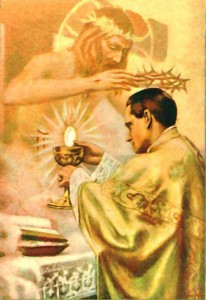Dear Fr. Zuhlsdorf,
My name is Fr. ___, and I am a priest of the Diocese of ___. I would appreciate it if you would keep my e-mail anonymous.
I wanted to tell you that I am learning the Extraordinary Form, and it has already positively influenced the way I celebrate the Ordinary Form. What a gift! When I work on learning the EF–even though I have not celebrated it yet–I understand my priesthood better.
Thank you for your work.
God bless you!
Fr. ___
Thanks for that note.
The additional benefit will be the knock on effect this will create through the way you celebrate also the Ordinary Form.
As I have written many times before, one of the reasons we need wider use of the Extraordinary Form is because of the knock on effect it produces through the priests who learn it. When young priests learn the older, traditional form, it shapes their priestly identity in a way that the Novus Ordo simply cannot. The deepening and strengthening of the identity of the priest at the altar will in turn produce effects among the people who are entrusted to the priests pastoral care.
Fr. Z kudos to Father.



































Didn’t Pope Emeritus Benedict XVI state that the EF Mass would also be enriched by the OF Mass? Any examples of this happening?
A young pastor in my diocese recently gave a talk in which he said:
“[As a seminarian} I read Sacrosanctum Concilium, the Conciliar document on the reform of the liturgy. . . . This opened my eyes to a world that I am still uncovering in its richness. . . . But it really didn’t all come full circle till I learned the Ancient Form of the Roman Rite. If scales had come off of my blinded eyes before, now it was like I had gotten an eye transplant. . . . The moment you are able to experience a Sung Mass in the Ancient Form and do it with even just a little bit of understanding, you can’t help but be blown away by the richness of faith that is laid out before you. . . .”
Wow, I am experiencing the same as the priest you mention above. Learning the EF has enriched my priestly ministry and my relationship with Jesus. Parishioners have begun to notice and they are surprised when I tell them what I have been reading and studying. I also realize that undoing 40 years of “nice” is not easy, but so worth it.
I own much to Fr. Z. God bless you and your work.
Fr Z you write, “When young priests learn the older, traditional form, it shapes their priestly identity in a way that the Novus Ordo simply cannot.”
I have seen this sort of comment before and would be interested in what specific ways it tends to shape their priestly identities. Are they apt to be more prayerful, penitential, more zealous to hear confessions, more cruciform in their day to day lives? I suspect all of the above, but is that the case? And if so, what from the EF is portable to the NO that would effect like changes?
Roguejim: Didn’t Pope Emeritus Benedict XVI state that the EF Mass would also be enriched by the OF Mass? Any examples of this happening?
For myself as a layman, the EF is enriched by the OF as ceasing to beat my face against a brick wall is enriched by first beating my face against a brick wall. The poor saps who lived back before St. Paul VI never knew how good that feels!
I cannot recall the exact wording, but I remember Michael Davies quoting Archbishop Lefebvre to the effect that priests who had been formed by the old Mass might be able to say the new Mass without ‘danger’ to their priesthood, but that the new Mass would/could not form priests properly… interesting to find a similar line of thought being expounded by these priests. As a laic I who has attended the TLM almost exclusively for about 16 years I wholeheartedly agree. I’ve met so many priests who are sincere and charitable men of good will, but who don’t know “who they are”… when you ask a priest about his vocation and their story is indistinguishable from that of a social worker it is a sad and terrible thing.
A brief thought- Pope Francis has alluded to “spiritual Alzheimer’s”, which I took as meaning: forgetting who we are, why we’re here, what our life – and work – are for, etc… It would seem to me that once a priest begins saying the TLM it would be an awful lot harder to succumb to “spiritual Alzheimer’s”!
Cool example of real learning of continuity!
As a lay person, I’m sure I don’t experience it on the same level, but one of the reasons I love reading this blog is the way all the things it teaches me about extraordinary form and other historical aspects of the Church help me understand the Church today and what the liturgy is supposed to be, even the ordinary form.
The pastor who left our parish three years ago and was assigned to a parish where he needed to learn the EF says the same thing. He recently commented that, before he learned the EF, he didn’t understand people who would say they only wanted Mass in the EF, but now he does.